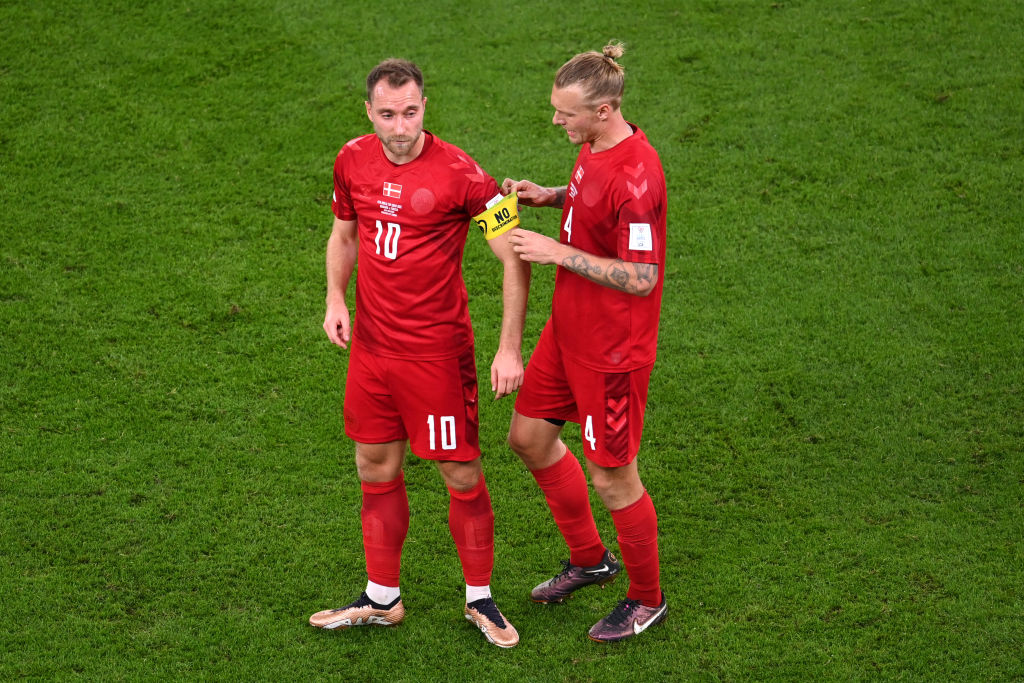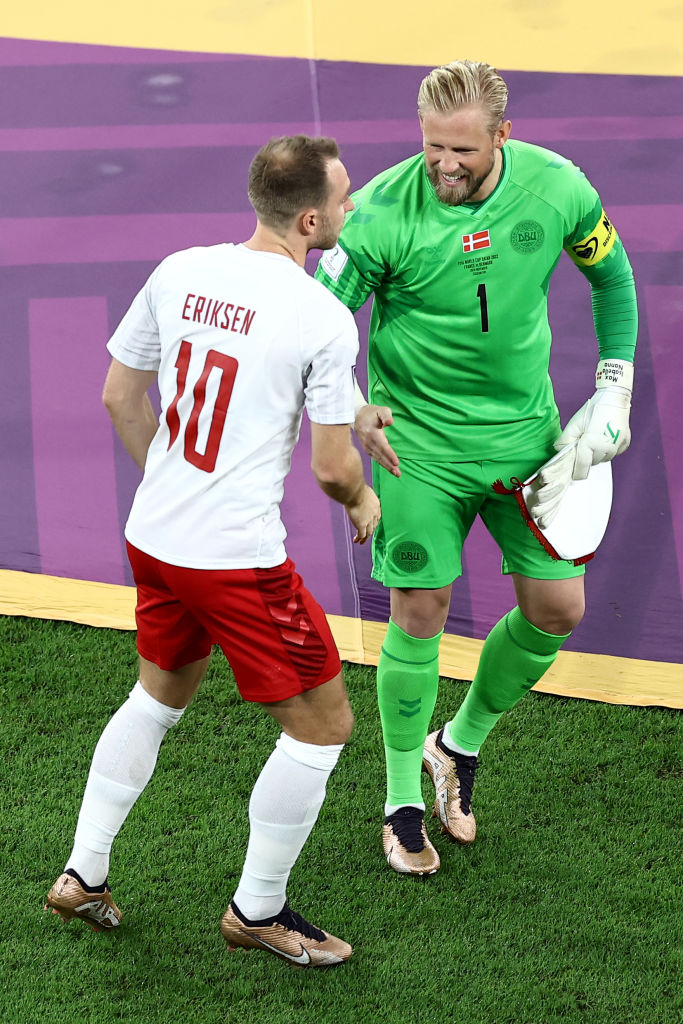The Danes need to beat Australia to go through to the last 16 but can be inspired by Christian Eriksen’s return – and their own rebound at the Euros in 2021, writes Tom Smithies.
On any other day it’s a well-meaning cliche, but here it’s laden with poignancy as Kasper Schmeichel tries to encapsulate what Christian Eriksen means to Denmark.
From both Schmeichel and his national coach, Kasper Hjulmand, there are thoughtful and obviously genuine accolades to a player who was already lauded as a world-class talent even before he survived a cardiac arrest in the middle of a game last year.
“Christian is the heart and soul of our team,” says Schmeichel and it resonates on so many levels. From the horror of watching the battle to restart that heart, his teammates now have the accentuated joy of playing with him at a FIFA Men’s World Cup once more.
On one level, Denmark’s players want to think nothing more of the minutes on a June afternoon in 2021 when Eriksen suffered a cardiac arrest in the middle of a game with Finland and had his life saved by players and nearby doctors. Captain Simon Kjaer received an award for starting CPR on Eriksen, almost certainly saving his life, but politely requested that it should be a “closed book” from that point on.

To beat Australia and gain the three points needed to leapfrog the Socceroos into the last 16, Denmark will need to be inspired by Eriksen. And yet, in many ways, they have already been inspired by not having him, and in a sense that presents the most danger of all to Graham Arnold’s side.
Eriksen’s collapse and the traumatic scenes which followed came in Denmark’s opening game of the Euros last year; once the game was restarted, his team-mates were clearly in shock and drifted to a 1-0 loss. Four days later they went down 2-1 to Belgium, and were staring at elimination.
So far, so familiar. The Danes needed to win their last game and hope the group’s other result went their way, just as they do in the final game of Group C in Doha. In 2021 it was against Russia in Copenhagen, on the same turf where Eriksen had collapsed.
By then Eriksen had been discharged from hospital; inspired by his recovery, the Danes won 4-1 and miraculously qualified from the group on goal difference, eventually getting to the semi-finals. It’s hard to overstate the effect on Denmark’s national psyche of the way Eriksen flirted with death but has somehow returned to football’s elite, let alone on the mental fortitude of his team-mates and friends.
“You play for the fun, the passion and suddenly, I was commentating on the Euros and it becomes an awkward, totally different, weird situation,” former Denmark goalkeeper Thomas Sorensen tells KEEPUP. “It is not about the sport, it is about life and death.
“It was tough. I shared a room with him at the 2010 World Cup when he was coming through as a young kid. We are from the same part of Denmark, I speak to him several times through the season. I am so happy now he is healthy.
“Speaking to him in December last year I knew he was fixed and focused on coming back, which is tremendous. But I never expected him to come back at this level.”
All of which is why, in terms of a game against Australia to qualify for the knockout stages, there’s pressure but there also is perspective. They did it once without him; now they will try to do it with him, feeding off this fabulously literate footballing mind.

“He is one of the most intelligent players, the brains of our team,” Schmeichel went on. “He possesses qualities like very few players but he’s also selfless – he works his socks off, runs like crazy.
“He is simply a world class player and I am so happy to see him playing every week for Manchester United. He is one of our most important players.”
Those brains have always been there since he attracted attention at Ajax and was bought by Tottenham in 2013. At his very first training session there was an Australian with a unique perspective, summoned to help Eriksen get up to speed for the rigours of the EPL.
Former Central Coast Mariners and Western Sydney Wanderers midfielder Giancarlo Gallifuoco was a member of Tottenham’s academy at the time, and says his first session with Eriksen left him “scars” in a positive way.
“His first training session at Spurs, he stayed back after training to get his fitness up and the gaffer (Andre Villas-Boas) asked me to stay back with him to do ‘1v1s’ as a cardio blow out at the end of the session,” Gallifuoco recalls.
“Unfortunately for me he proceeded to send me every which way for the next 15 minutes until I had stars flying around my head like I was in a cartoon! That dizzying experience was a fantastic motivator for me, he inadvertently taught me a valuable lesson that I think is crucial in football; constantly remember around the corner there is someone better then you, you can never stop trying to improve yourself.
“Christian came in humble as pie, a top bloke and a top professional. He’s someone no one could say a bad word about. He’s all class on and off the pitch.
“As a player, he is calm and composed with amazing technical ability, he has an amazing insight for the game and is constantly looking for the most penetrative pass, just a world class footballer.”
That ability can be appreciated by everyone, including Eriksen’s opponents in Denmark’s final Group D game. “Fantastic, inspirational… it’s just marvellous that he’s here,” Socceroos boss Graham Arnold said.
“And it’s truly great that we are going to be playing against him. It was such a special moment for the Danish national team as well when he came back.
“Now he’s at Man United and seeing what he is doing shows the rest of the world what a strong character he is, and what a top person.
“I don’t know him, of course, but you can see that when that sad moment occurred, that everyone rallied around him and behind him.
“To see him now back and being at this World Cup, it’s special for us to be able to play against him.”
Denmark’s head coach Hjulmand has earned and deserves widespread praise for his management and support of his players through the Eriksen episode and afterwards. Warm, engaged and funny, he understands why his star midfielder needed to be able to play again, in order to feel that his recovery was complete.
“He is a football person to his bones,” Hjulmand says. “He’s always the last at training, wants to keep kicking the ball, always has one under his arm.
“His love for the game is inspirational for our young players because they see his passion for the football, not the things that surround it.
“When I have conversations with people like Kasper (Schmeichael) we talk about things like leadership, but after two minutes with Christian he wants to talk about football again.
“As a coach, it is just an inspiration to work with a player like that.”





